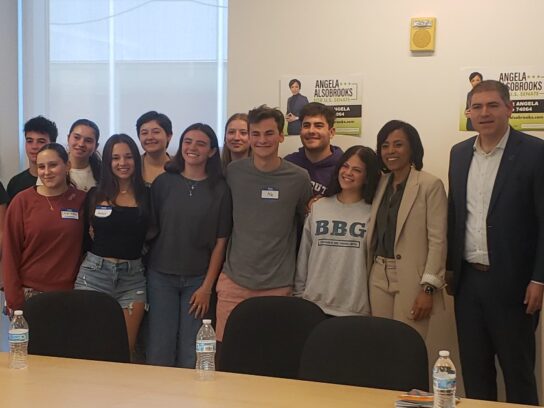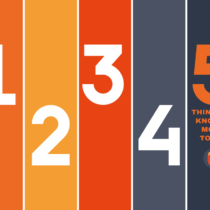
A dozen Jewish students attending schools throughout the Montgomery County area told Prince George’s Executive Angela Alsobrooks how unsafe, fragile and unsupported they feel due to the numerous antisemitic incidents they have experienced in school and on social media.
Alsobrooks, the Democratic candidate for U.S. Senate, met recently with Maryland Del. Jared Solomon (D-18), who co-chairs the Jewish Legislative Caucus on the House side. They talked about several topics including antisemitism. She asked Solomon to help her meet with some high school students so she could hear directly from them.
On Wednesday, the legislators and students got together in the Silver Spring Civic Center and spoke from the heart.
Alsobrooks told the students that her goal as a politician is to “shape for you the kind of country we want for you,” adding, “Your generation has suffered a lot, a lot, from antisemitism. You have experienced the anger, the intolerance.”
Yesterday @AlsobrooksForMD & I met with a group of courageous & accomplished Jewish students from across MoCo about the rise in antisemitism, its impacts, & how we beat it. Thank you Angela for prioritizing young people & for standing strong against hate & antisemitism! pic.twitter.com/LcRB1tFb9D
— Delegate Jared Solomon (@jaredssolomon) August 29, 2024
She related her college years at Duke as one of only three Black women in her dormitory. She was told the slavery was “kind of cool” and asked, “Who wouldn’t want to have slaves?” She also was told by her freshman year White roommate that her relatives told her they felt sorry for her, because she had a Black roommate.
Heather, a senior at Richard Montgomery High, told Alsobrooks she was targeted on social media when she ran for student government. Fellow students “spread some really hateful stereotypes,” she said.
Education is needed, she and many other students, agreed. Students should learn about the Holocaust before 11th grade and should know about Judaism.
Alsobrooks agreed. “The education has been missing for a very long time. We don’t understand each other.”
Maya, a sophomore at Richard Montgomery, recalled how about once a quarter last year she received an email from her principal talking about the latest swastika in the bathroom or other antisemitic incident. It’s easy for students to become desensitized, but to her, “It’s hatred.:
Sam, a senior at John F. Kennedy High School, said there are very few Jewish students at his school but still someone drew swastikas “on every single tile” on all four walls of a bathroom.
Eliza, a senior at Wheaton High School, remembered how she felt when antisemitic comments were air dropped onto her phone.
After the students stopped talking about specific incidents, they began criticizing various teachers, principals and administrators who they believe put the onus on the victims.
Jewish students sometimes must meet with those who drew the swastikas or said the antisemitic comments and are expected to tell them why it is hurtful and often inaccurate.
“It was just very ineffective and not worthwhile,” one Whitman High School student said of her time listening to students read an apology letter.
Gabby, who also attends Whitman, called it “kind of traumatic having to report something that happened to you. It’s also hard to have to make your own experience better.”
When Claire, a senior at Wootton High School who is editor in chief of her school newspaper, wrote what she described as a current events article last year concerning events in Israel and Gaza, she showed it to an English teacher first. The teacher responded with what Claire called false information and stereotypes.
She opted not to change her article and for the rest of the school year that teacher “was very rude to me in the hallways.”
Alsobrooks shook her head, declaring, “It was beyond unprofessional. It was wrong.”
If elected to the senate, Alsobrooks said she would strive to protect young people from social media and stress education.
Solomon thanked the students. “It takes courage to come in. This is the beginning of the conversation. We are not going to let this become normal.”
PG Exec Alsobrooks and Del. Solomon meet with a dozen Jewish high school students to understand their perspective and what they care about @mymcmedia pic.twitter.com/1QF3fLs5LU
— suzanne pollak (@SuzannePollak) August 28, 2024

Comments are closed.